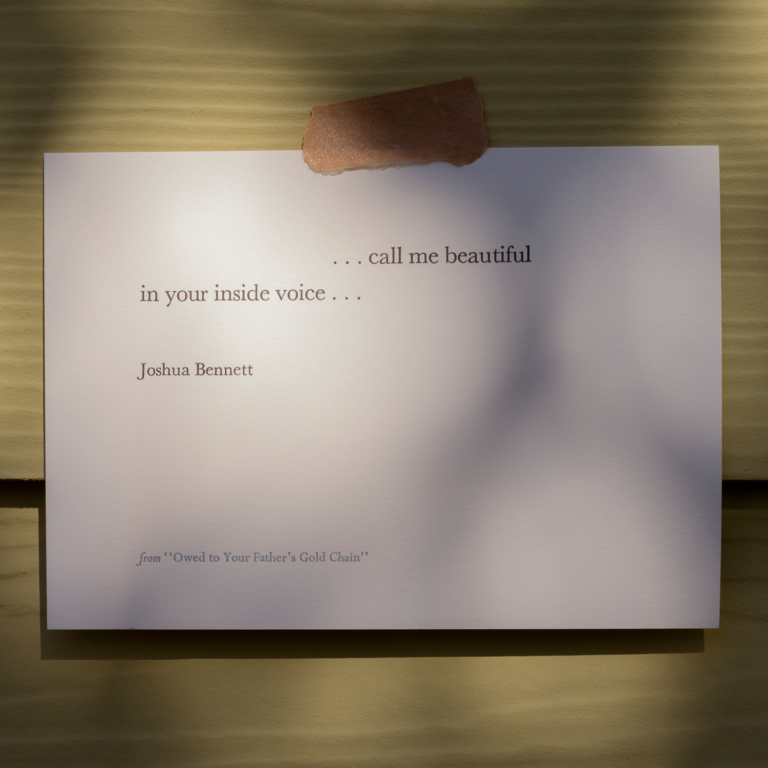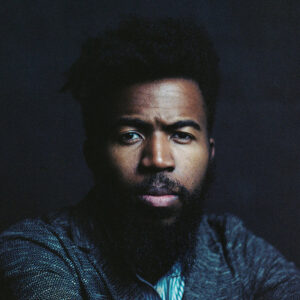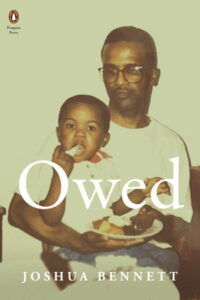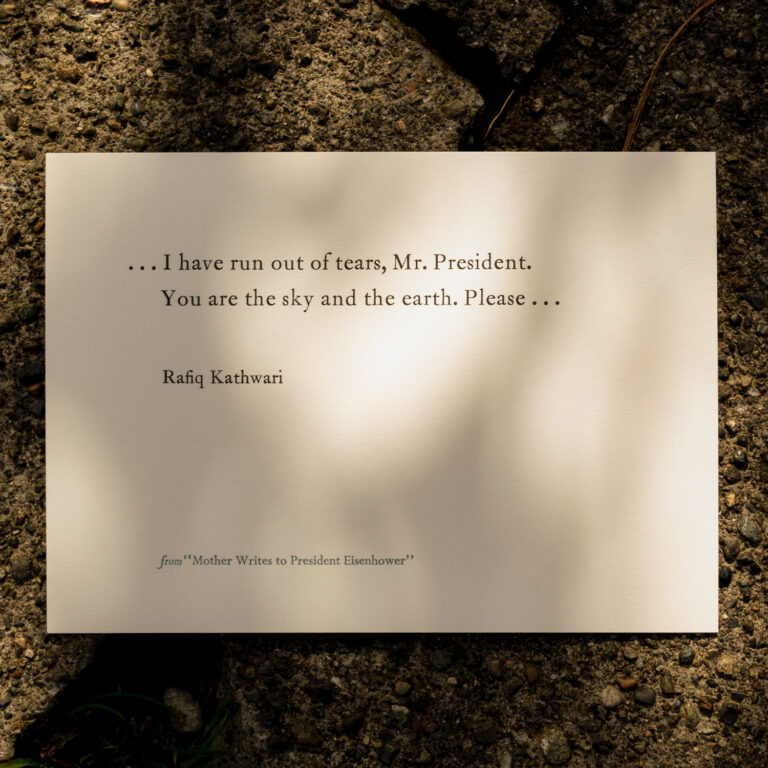Joshua Bennett
Owed to Your Father’s Gold Chain
Sometimes when your world changes, it seems like everything turns towards you, fresh, new, and curious.
We’re pleased to offer Joshua Bennett’s poem, and invite you to sign up here for the latest from Poetry Unbound.

Letterpress print by Myrna Keliher. Photography by Lucero Torres. © All Rights Reserved.
Guest

Joshua Bennett is the author of The Sobbing School — which was a National Poetry Series selection and a finalist for an NAACP Image Award. He is also the author of Being Property Once Myself, Owed, The Study of Human Life, and Spoken Word: A Cultural History, which is forthcoming from Knopf. He has received fellowships and awards from the Guggenheim Foundation, the Whiting Foundation, the National Endowment for the Arts, and the Society of Fellows at Harvard University. He is a Professor of English at Dartmouth College.
Transcript
Transcription by Heather Wang
Pádraig Ó Tuama: My name is Pádraig Ó Tuama. And so many poems across centuries, and maybe even millennia, are about the story of a name — the name that’s given to somebody, the name that they change their name to. I used to hate my name. It means “nobleman from the hills.” And “Ó Tuama” comes from a Latin word, which we have in English, also: “tomb,” places of the dead. So maybe my name means “nobleman from the places of the dead.” And the older I’ve gotten, the more I’ve settled into my own name and the more, too, that I’m really glad for it and really glad for the changing way within which a name can mean multiple things, depending as to what stage your life you’re at.
[music: “Praise the Rain” by Gautam Srikishan]
“Owed to Your Father’s Gold Chain” by Joshua Bennett:
“Since we are already on the topic,
I casually mention that I think we should
name the baby Ajax, & you laugh
so hard that both your shoulders shake
“as you mouth an adamant no,
your arms waving wild in front
of your face like some novice
air traffic controller. You later explain
“that this is not only quote unquote
a terrible name but also that it makes
you think of innumerable Thursdays
spent cleaning bathrooms at your grandma’s
“house. And yes, I know, there must be a joke
about class stratification in there somewhere,
since the name Ajax also makes me think
of that magical white dust in the cardboard
“blue box long before it does any ancient
Greek demigod, but I tend to assume
my first thought is not my best thought,
as you now know well. I often attribute
“this fact to my sound colonial education,
but am not yet sure what you would call
or think of it. One might say that this,
in fact, is a working definition for love
“in a time of general disenchantment. The meticulous
consideration of all that slipped through
the mind’s wet meshwork before, minor
miracles, like the number of bones in a human
“hand. How yours unfastens like a memory
when I request an impromptu waltz
across the bar’s threshold & we circle
one another, as if swordsmen, in the low light.
“How the next week, you clasp your father’s gold
chain at the back of my neck, call me beautiful
in your inside voice, barely breaking a whisper,
as if you can’t hear the dawn roaring
“its way through the bedroom window
just to catch a glimpse of us here,
barely mortal, shimmering at the cusp
of this strange & untamable world.”
[music: “The Edge of All There Is” by Gautam Srikishan]
I love this poem for all kinds of reasons. And after the first time I read it, I repeated to myself: “we circle / one another, as if swordsmen, in the low light,” over and over because the words were so delicious to say in that order.
It’s a dialogical poem, which is an unnecessarily formal way of saying that it’s a poem about a conversation. And the conversation is, what will we call our child? And in the context of that conversation, so much is being held: all the ways in which the name of a child is the naming of a world, their own presence in the world, and it’s a curiosity about how the world will look at the child and how the child will look at the world.
The characters in this poem are deeply in love, and they emerge so joyfully, and fully in combat and dialogue. He says, “Since we are already on the topic, / I casually mention that I think we should / name the baby Ajax.” There’s nothing casual about “casual,” here. You can get the impression that he’s been thinking, When’s the right time that I can mention this?
And then her reply is magnificent. They know each other so well that he can predict, it seems, that she is likely to disagree entirely with his suggestion. And she laughs and mouths “no” and waves her arm in front of her face — complete disagreement, and complete joy in their disagreement.
And that’s one of the really interesting things. She’s kind of implying, What on earth were you thinking?, rather than using this a way to start a catastrophic argument. And here is the presence of great love. Here is the presence of joy in the midst of all the things that they think differently about.
[music: “The House You Wake In” by Gautam Srikishan]
There’s so much in this poem about how they know each other. Like he knows pretty well that she’s unlikely to like his suggestion, and then she comes back, saying that “Ajax” reminds her of cleaning the bathrooms at her grandmother’s. And then he is saying that he, too, had thought that, but he’d second-guessed himself, knowing that “Ajax” is the name of a Greek demigod and thinking, No, let me go there. And then he’s wondering, Why did I second-guess myself? And he’s wondering should he blame this on a “colonial education.” But then he’s thinking, Well, actually, maybe she would disagree with me about that. I’m not sure if she would blame my habit of second-guessing myself on my education or on something else. And over and over again, this poem is talking about what it means to behold somebody you love and be beheld by somebody you love, and the changes and modification and negotiation and clash and delight that happens in such beholding.
Whenever I read this poem, I think that it’s a great poem, but it’s also a poem about a great love. And I find myself thinking, what a lucky child to have this wonderful plateau of delight and pleasure and opposition and electricity as the homestead into which you’re born.
[music: “Daybreak” by Gautam Srikishan]
There are really gorgeous similes in this poem: “your face like some novice / air traffic controller,” and then your hand “unfastens like a memory,” and then “we circle / one another, as if swordsmen, in the low light.” And these similes work so brilliantly. The first is visual — simply somebody saying, with their face in their hand, “no, no, no,” like, How do I stop this bad idea of a name like “Ajax” from landing? And then the second is so quiet, those gorgeous m’s in “memory,” “unfastens like a memory.” There is an echo, perhaps, of the word “mama” happening in that, anticipating what’s coming towards them.
And then the last one: “we circle / one another, as if swordsmen, in the low light” — there’s a delicious play of opposition in this couple, and equality and shared energy and the enjoyment of not trying to pretend that they agree on everything, but the unfolding world that happens when they know how to disagree with such playfulness. Opposition in this clash of these “swordsmen” doesn’t mean oppression, but opposition means love and dance and making each other more brilliant and seeing each other in a more beautiful and loving light.
[music: “The House You Wake In” by Gautam Srikishan]
This poem is titled “Owed to Your Father’s Gold Chain,” and the gold chain obviously comes in toward the end of the poem, but “ode” here is spelled in a way that’s different to how it normally would be spelled as a title of a poem. Often, “owed” is spelled “ode” — kind of a praise song. But here, Joshua Bennett spells it as “owed.” It’s a play on sound. And this is a discussion, in this poem, about the question of inheritance. What will this child of theirs inherit, as he has inherited a gold chain from a father? And what inheritance do they live with, what are the complicated inheritances, what are the stories they inherit, do you know? Of a Greek demigod, or of cleaning the bathroom? Of a colonial education, or an inheritance that they’re shaping by the way that this couple love each other?
Obviously, the question about what to name a baby is at the heart of this, and that question has been troubling humanity for a very long time. Will the name that we give a child shape the child’s future? Will it shape the way the world looks at the child or the way the child looks at the world, or will it shape the world, indeed? What is the future going to be, this unknowable thing, “this strange & untamable world,” as Joshua Bennett finishes off this poem with?
And here in the midst of all that’s unknown, they’ve turned to a certain kind of playful, combative, deeply loving, deeply equal dance with each other, which is filled with their own individuality, as well as filled with that which holds them together, which is love, which is that gold chain, which is the names they give each other, which is the way that they shape and contribute to each other, as they face into this new world of being parents and this whole new world that will happen as the result of one child’s birth.
[music: “The Edge of All There Is” by Gautam Srikishan]
“Owed to Your Father’s Gold Chain” by Joshua Bennett:
“Since we are already on the topic,
I casually mention that I think we should
name the baby Ajax, & you laugh
so hard that both your shoulders shake
“as you mouth an adamant no,
your arms waving wild in front
of your face like some novice
air traffic controller. You later explain
“that this is not only quote unquote
a terrible name but also that it makes
you think of innumerable Thursdays
spent cleaning bathrooms at your grandma’s
“house. And yes, I know, there must be a joke
about class stratification in there somewhere,
since the name Ajax also makes me think
of that magical white dust in the cardboard
“blue box long before it does any ancient
Greek demigod, but I tend to assume
my first thought is not my best thought,
as you now know well. I often attribute
“this fact to my sound colonial education,
but am not yet sure what you would call
or think of it. One might say that this,
in fact, is a working definition for love
“in a time of general disenchantment. The meticulous
consideration of all that slipped through
the mind’s wet meshwork before, minor
miracles, like the number of bones in a human
“hand. How yours unfastens like a memory
when I request an impromptu waltz
across the bar’s threshold & we circle
one another, as if swordsmen, in the low light.
“How the next week, you clasp your father’s gold
chain at the back of my neck, call me beautiful
in your inside voice, barely breaking a whisper,
as if you can’t hear the dawn roaring
“its way through the bedroom window
just to catch a glimpse of us here,
barely mortal, shimmering at the cusp
of this strange & untamable world.”
[music: “Praise the Rain” by Gautam Srikishan]
Chris Heagle: “Owed to Your Father’s Gold Chain” comes from Joshua Bennett’s book Owed. Thank you to Joshua and Penguin Books, who gave us permission to use the poem. Read it on our website, at onbeing.org.
[music: “Praise the Rain” by Gautam Srikishan]
Poetry Unbound is: Gautam Srikishan, Erin Colasacco, Eddie Gonzalez, Lilian Vo, Lucas Johnson, Kayla Edwards, and me, Chris Heagle.
Our music is composed and provided by Gautam Srikishan and Blue Dot Sessions.
This podcast is produced by On Being Studios, which is located on Dakota land. You may enjoy our other podcasts: On Being with Krista Tippett, Becoming Wise, and This Movie Changed Me. Find those wherever you’d like to listen, or visit us at onbeing.org to find out more.
Books & Music
Recommended Reading
The On Being Project is an affiliate partner of Bookshop.org and Amazon.com. Any earnings we receive through these affiliate partnerships go into directly supporting The On Being Project.









Reflections